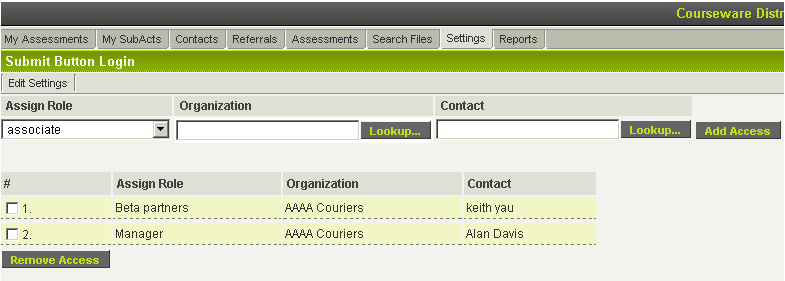Difference between revisions of "Application Scope Access"
| Line 1: | Line 1: | ||
| − | The '''UTA Application Scope Access''' feature on the [[UTA Settings - Settings|Settings]] page of all [[UTA]]s allows you to assign a designated [[Role|role]] to a [[User|user]] if branch or company of a {{l1}} instance is in the list. In other words you can define implicit permission | + | The '''UTA Application Scope Access''' feature on the [[UTA Settings - Settings|Settings]] page of all [[UTA]]s allows you to assign a designated [[Role|role]] to a [[User|user]] if branch or company of a {{l1}} instance is in the list. In other words, you can define implicit permission for a given user to UTA objects without them being explicitly indicated on a record. It also lets you associate the permissions of an individual to those of a particular company. |
| − | Impact: A [[User|user]] can now see the | + | Impact: A [[User|user]] can now see the {{l1}} items of a company based on the [[Security Matrix|matrix permissions]] of the selected [[Role|role]]. |
| − | In the example below, | + | In the example below, "Alan Davis" can see all of the {{l1}} items belonging to "AAAA Couriers." When he looks at the [[Security Matrix]] items he will be restricted by the [[Security Matrix]] permissions of the "Manager" [[Role|role]]. |
| − | These permissions mean that the [[User|user]] does not have to be directly attached to the | + | These permissions mean that the [[User|user]] does not have to be directly attached to the {{l1}} item. They do not have to be the [[owner]], assigned or in an associated company in order to see the items. |
[[Image:Car2.png]] | [[Image:Car2.png]] | ||
Revision as of 10:51, 26 June 2013
The UTA Application Scope Access feature on the Settings page of all UTAs allows you to assign a designated role to a user if branch or company of a Level 1 instance is in the list. In other words, you can define implicit permission for a given user to UTA objects without them being explicitly indicated on a record. It also lets you associate the permissions of an individual to those of a particular company.
Impact: A user can now see the Level 1 items of a company based on the matrix permissions of the selected role.
In the example below, "Alan Davis" can see all of the Level 1 items belonging to "AAAA Couriers." When he looks at the Security Matrix items he will be restricted by the Security Matrix permissions of the "Manager" role.
These permissions mean that the user does not have to be directly attached to the Level 1 item. They do not have to be the owner, assigned or in an associated company in order to see the items.
